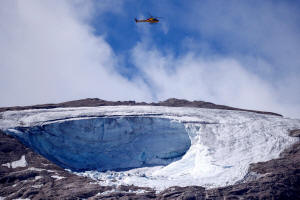|
"Right now after what happened I feel a bit scared because two
days ago we were about to walk just near the glacier. It could
have happened to us," said Mikael Bouchard, a 29-year-old from
Lyon.
"We were planning to go near the glacier but right now we are
going to do another way (route) to avoid it. So yeah, it's
really scary," added Bouchard, who was walking lower down the
mountain.
Rescue teams resumed the search on Tuesday for 13 climbers who
were still missing almost two days after part of a glacier gave
way on the Marmolada, which at more than 3,300 metres (10,830
ft) is the highest peak in the Dolomites.
Canadian tourist Oscar Wong, who lives in Seattle, said he would
continue his trip but try to be aware of the dangers.
"Certainly I think the risks are elevated.. (and) have to take
that into consideration when I'm planning my routes," the 28
year-old said.
A huge mass of ice collapsed close to Punta Rocca, on the route
usually used by hikers and climbers to reach the summit, the
Alpine rescue unit said.
Temperatures on the normally freezing Marmolada had reportedly
touched 10 degrees Celsius (50 Fahrenheit) over the weekend.
Scientists said rising temperatures were making glaciers more
unstable.
"I've never heard of something like this happening, especially
in the summertime in July, especially in this region so it's
definitely a surprise to me," added Wong.
(Writing by Emily Roe and Keith Weir, Editing by Alexandra
Hudson)
[© 2022 Thomson Reuters. All rights
reserved.]
This material may not be published,
broadcast, rewritten or redistributed.
Thompson Reuters is solely responsible for this content.

|
|




